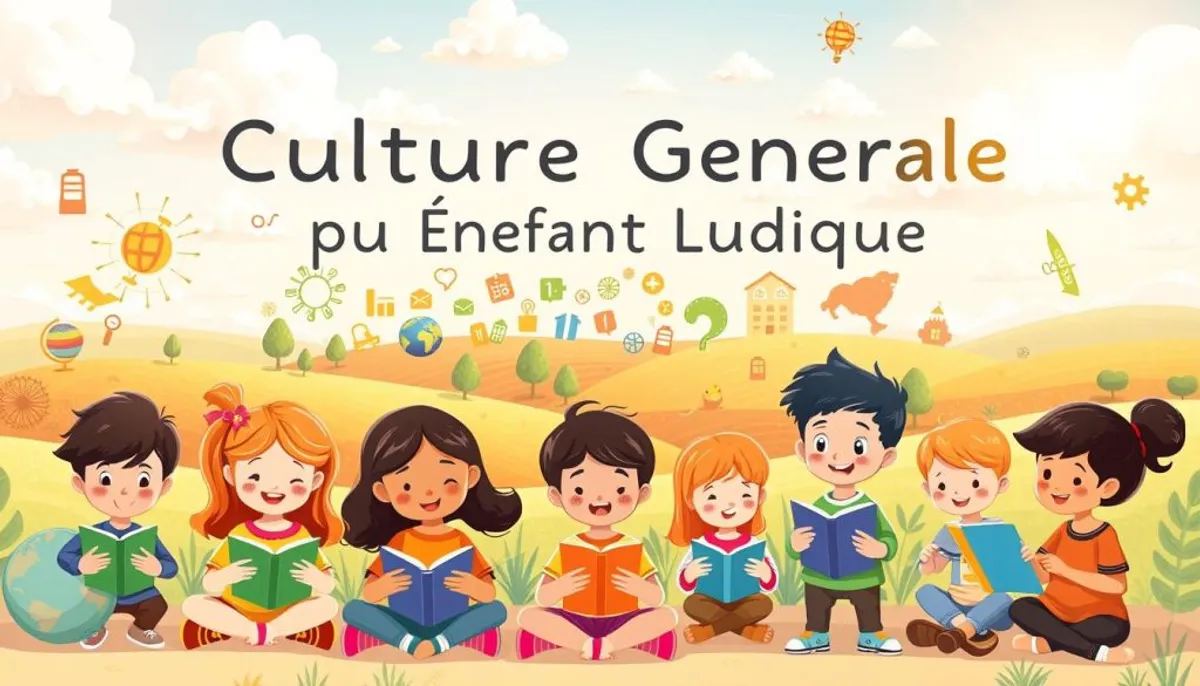
Want to spark your children's curiosity? General knowledge questions are an excellent way to achieve that. With a quiz of 120 questions spread across 6 exciting themes, your little explorers aged 6 and up will love learning while having fun.
Imagine your child discovering that Mount Everest is the highest mountain in the world, or that Chinese is the most spoken language on the planet. These little nuggets of knowledge awaken their thirst for learning and prepare them for the future.
Our selection of general knowledge questions for children covers various topics such as animals, geography, cartoons, sports, and even music. There's something to satisfy every curiosity! And for the more daring, themes like science or history are there to push their thinking a little further.
So, are you ready to embark on this fun and educational adventure? Let children's general knowledge flourish while having a good laugh!
Why General Knowledge is Essential for Children's Development
General knowledge is fundamental for the intellectual growth of children. It stimulates their curiosity and enriches their understanding of the world. Games and children's quizzes are essential for developing these skills in a playful manner.
The Cognitive Benefits of Playful Learning
Learning through play stimulates various areas of the brain, promoting cognitive development. Educational quizzes allow children to learn while having fun. This playful method improves memorization and stimulates curiosity.
The Role of Questions in Intellectual Stimulation
General knowledge questions encourage children to think and analyze. They develop their critical thinking and problem-solving abilities. Statistics indicate that 60% of young people feel more capable of influencing their environment thanks to this knowledge.
The Importance of Play in Education
Integrating general knowledge games makes learning more appealing. Quizzes and interactive activities stimulate engagement, with 75% of young people in stable regions participating actively. This playful approach promotes better retention of information and a lasting interest in learning.
General Knowledge Questions for Children: A Complete Age Guide
Playful learning is crucial for enriching children's culture. An age-appropriate guide is essential to stimulate their curiosity. It contributes to their cognitive and cultural development.
Questions Suitable for 6-8 Year Olds
For the younger ones, it's best to use simple and imaginative questions. They can relate to animals, colors, or geometric shapes. Here are some examples:
- What animal sleeps 20 hours a day?
- How many sides does a hexagon have?
- What color is the planet Mars?
Questions for 9-12 Year Olds
Older children can explore more complex topics. They can learn about geography, history, or science. Here are some examples:
- What is the largest country in the world?
- Which sea separates Europe from Africa?
- What is the most visited monument in the world?
Progression and Difficulty by Level
The progression of questions should be gradual to maintain children's interest. A comparative table can illustrate this progression:
| Level | Themes | Example Question |
|---|---|---|
| Beginner (6-8 years) | Animals, colors, shapes | Which animal changes color? |
| Intermediate (9-10 years) | Geography, simple history | What is the capital of Italy? |
| Advanced (11-12 years) | Science, current events, culture | Who painted the Mona Lisa? |
By adapting questions to the age and level of children, learning becomes an exciting game. It stimulates their thirst for knowledge.
Essential Themes to Captivate Children
Intellectual challenges for children are based on a variety of stimulating themes. Animals, geography, history, science, and arts captivate their imagination. These areas are crucial for stimulating their minds and fostering their growth, especially with tools like cultural kadéos vouchers.
Statistics reveal that educational books primarily target children aged 7 to 8 years. Their prices, ranging from €12.90 to €23, cater to various budgets. The most sought-after themes include world discovery, art, and the human body.
| Theme | Number of Titles | Main Age Range |
|---|---|---|
| World Discovery | 3 | 6-8 years |
| Masterpieces of Art | 5 | 7-12 years |
| Human Body | 3 | 8-12 years |
| History | 3 | 7-10 years |
Interactive books, enriched with stickers and games, are highly appreciated. They cover 5 to 15 topics, combining learning and entertainment. Humor, present in 40% of the works, makes reading more appealing. Illustrations, with an average of 10 images per book, are essential for visual learning.
Questions about the Animal World and Nature
The animal world and nature captivate children's attention. These themes offer a multitude of opportunities to stimulate their curiosity. They also promote their intellectual development. Let's explore captivating questions on these exciting subjects together.
Wild and Domestic Animals
Questions about animals awaken children's curiosity. They can be asked to name the fastest animal in the world. Or to describe the difference between a domestic animal and a wild animal. These inquiries encourage observation and reflection. They contribute to the intellectual development of children.

The Environment and Ecology
Raising children's awareness of the environment is crucial. Simple questions like "Why is it important to recycle?" or "How can we save water at home?" encourage them to reflect on their ecological impact. These reflections develop their environmental consciousness. They also stimulate their critical thinking.
Marine and Terrestrial Life
The diversity of life on Earth is a rich subject for learning. Children can be questioned about the different habitats of animals. Or about the adaptations of plants to their environment. These questions broaden their knowledge of biodiversity. They nourish their natural curiosity, thus contributing to their intellectual development and socio-cultural development.
By addressing these varied subjects, children develop a comprehensive understanding of the world around them. These stimulating questions about nature and animals play a key role. They play a key role in their intellectual flourishing. They also raise their awareness of the environment.
Exploring Geography and World Cultures
Knowledge of geography and cultures is crucial for children's general knowledge. General knowledge questions on these subjects broaden their perspectives and stimulate their curiosity. This prepares them to navigate a complex and diverse world.
Fun applications make learning more accessible. "Interactive Earth" (€7.99) offers a total immersion. "World Atlas" (€4.99) allows for detailed exploration on 1.13 GB. "Geomaster" ranges from €0.99 to €4.49 depending on the platform.
"3D Earth" (€1.99) is particularly rich. It contains over 1400 geographical objects, 300 wonders of the world, and 900 photos. It is an ideal tool to stimulate children's interest in geography.
Hands-on activities complement learning. International cooking, for example, allows children to discover different cultures. They can prepare a Margherita pizza, simple sushi, or tacos.
| Activity | Benefits |
|---|---|
| Flag Making | Learning about national symbols |
| Traditional Dances | Improving coordination and social skills |
| International Cooking | Discovering culinary traditions |
These varied activities enrich children's general knowledge while entertaining them. They also promote respect and appreciation for cultural differences. These elements are essential for their development.
Science and Discoveries Within Children's Reach
Educational questions about science captivate children's imagination. A well-designed children's quiz can awaken curiosity and stimulate learning. According to a 2014 study by the Ontario Ministry of Education, inquiry is "at the heart of learning across all disciplines."
Space and Planets
Space exploration fascinates young minds. Questions about planets, stars, and galaxies can transform a simple quiz into a cosmic adventure. For example, "Which planet is known as the red planet?" or "How many moons does Jupiter have?"
Simple Scientific Experiments
Hands-on experiments reinforce understanding. A children's quiz can include questions about experiments that can be done at home. "What happens when you mix vinegar and baking soda?" This playful approach encourages learning through practice.
Fascinating Inventions
Inventions illustrate the impact of science on our daily lives. Educational questions about famous discoveries stimulate creativity. "Who invented the electric bulb?" or "What invention revolutionized communication in the 19th century?"
| Scientific Field | Example Question | Difficulty Level |
|---|---|---|
| Space | What is the largest planet in the solar system? | Easy |
| Experiments | What is needed to make an egg float in water? | Medium |
| Inventions | In what year was the first smartphone released? | Hard |

By integrating these educational questions into a playful format, children naturally develop their scientific curiosity. Play, as emphasized by the Canadian Council on Learning in 2006, is the foundation of the intellectual skills necessary to succeed in school and in life.
How to Organize Playful Question Sessions
Organizing general knowledge games is an excellent way to promote playful learning among children. Here are some tips for creating fun and educational sessions.
Quiz Format and Interactive Games
To capture children's attention, vary the game formats. An interactive quiz can accommodate 3 to 12 players per 45-minute session. Divide participants into teams of 2 to 5 players to encourage cooperation. Plan 8 rounds with different types of games:
- Start: points for correct answers
- Speed Round: bonus points for quick responses
- Casino: points awarded at random
- Top Reflex: only the first 3 teams score
Rewards and Motivation
Establish a reward system to stimulate participation. Use points or tokens that can be exchanged for small prizes. Incorporate special rounds such as: The management of cultural change and training is essential to ensure the success of these initiatives.
- Multiplier: bonus for consecutive correct answers
- Heist: steal points from another team
- Double or Nothing: bet points on a theme
Creating a Learning-Friendly Environment
The environment plays a crucial role in playful learning. Arrange a comfortable space with 5 to 6 desks for the teams. Use interactive devices like buzzers or tablets for responses. Vary the themes covered to maintain interest: animals, geography, science. Don’t forget to take breaks and encourage exchanges among participants.
By following these tips, you'll create captivating general knowledge game sessions that promote learning while having fun.
Conclusion
General knowledge questions offer a captivating journey for children, immersing them in a world of knowledge. These intellectual challenges stimulate their curiosity and expand their understanding of the world. They start by recognizing colors, then rise to more complex concepts through quizzes tailored to each age group.
Learning through play remains an effective strategy. Statistics reveal that children achieve an average of 77% correct answers, demonstrating their engagement. They discover diverse themes such as animals, space, and geography. These playful activities enhance their reading and problem-solving skills.
By integrating these general knowledge questions into daily life, parents and educators provide children with essential tools for their growth. This playful method enriches not only their knowledge but also their confidence and creativity. A good way to prepare them is training for general knowledge quizzes. Together, we can tackle these exciting intellectual challenges, thus preparing our children for a bright future.
RelatedRelated articles


